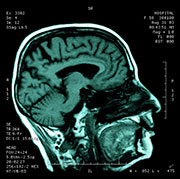- Could Your Grocery Store Meat Be Causing Recurring UTIs?
- Are You Making This Expensive Thermostat Error This Winter?
- Recognizing the Signs of Hypothyroidism
- 10 Strategies to Overcome Insomnia
- Could Artificial Sweeteners Be Aging the Brain Faster?
- Techniques for Soothing Your Nervous System
- Does the Water in Your House Smell Funny? Here’s Why
- Can a Daily Dose of Apple Cider Vinegar Actually Aid Weight Loss?
- 6 Health Beverages That Can Actually Spike Your Blood Sugar
- Treatment Options for Social Anxiety Disorder
Not Everyone With Alzheimer’s-Linked Protein Develops Dementia: Study


The human brain may have a way to compensate for the build-up of a destructive protein associated with Alzheimer’s disease. That could help explain why some older people who have beta-amyloid deposits do not develop dementia, California researchers report.
“This study provides evidence that there is plasticity or compensation ability in the aging brain that appears to be beneficial, even in the face of beta-amyloid accumulation,” said the study’s principal investigator, Dr. William Jagust. He’s a professor with joint appointments at University of California, Berkeley’s Helen Wills Neuroscience Institute, the School of Public Health and Lawrence Berkeley National Laboratory.
The study, published Sept. 14 in Nature Neuroscience, involved 22 healthy young adults and 49 older adults who showed no signs of mental decline. Using brain imaging technology, known as functional MRI, the researchers monitored the participants’ brain activity while they memorized pictures of various scenes.
The brain scans showed that 16 of the 49 older adults had beta-amyloid deposits in their brain; the other 55 participants did not, according to the study, which was partially funded by the U.S. National Institute on Aging.
After viewing the images, the participants were asked to recall if one of the images they saw matched a written description of a scene. The participants were also asked about various details of the scenes they memorized.
“Generally, the groups performed equally well in the tasks, but it turned out that for people with beta-amyloid deposits in the brain, the more detailed and complex their memory, the more brain activity there was,” Jagust said in a university news release. “It seems that their brain has found a way to compensate for the presence of the proteins associated with Alzheimer’s.”
Although it remains unclear why some older people with beta-amyloid deposits are able to compensate with different parts of their brain, the researchers noted that previous studies suggest years of mentally stimulating activity may have something to do with it.
“I think it’s very possible that people who spend a lifetime involved in cognitively stimulating activity have brains that are better able to adapt to potential damage,” he said.
More information
The U.S. National Institute on Aging has more on Alzheimer’s disease.
Source: HealthDay
Copyright © 2026 HealthDay. All rights reserved.










